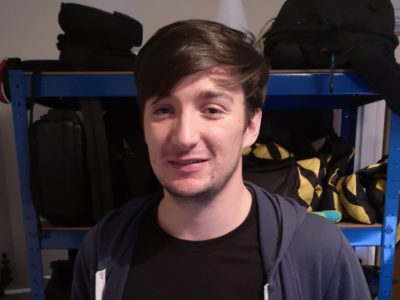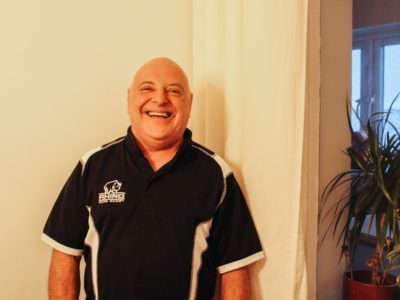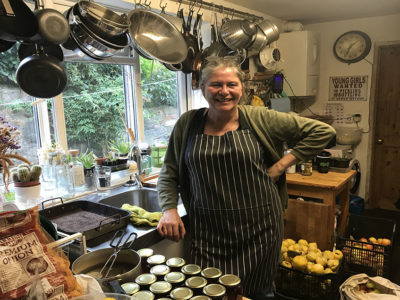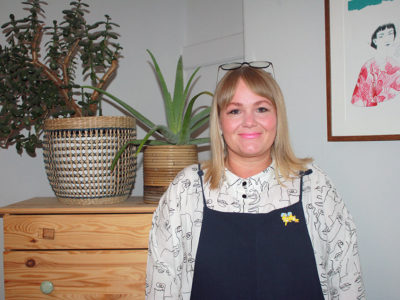Q&A with Gaio de Lima
What was your first instrument?
The cavaquinho, a kind of Brazilian ukulele.
What’s the last instrument you’ve picked up?
The West African harp called kamale ngoni, which means “youth harp”. I learnt it in Mali.
And what’s your favourite instrument?
It’s so hard to answer [laughs], it’s like asking a father to pick a favourite son!
Pick three things you like about Cardiff so far
Number one is definitely nature. Cardiff reminds me of Rio de Janeiro sometimes because of the fusion between city and nature. Then I like Cardiff people, they seem much more relaxed than in London! And finally I love the infrastructure Wales offers. There are many buildings specifically designed to put people together.
Now pick three things you don’t like about Cardiff.
Oh, I never thought about it. I don’t like buses here – but maybe that’s just because I can’t use them very well. Being used to London where you have buses all the time, I’m having a hard time adjusting to Cardiff’s buses. But I can’t find other things I don’t like!
Pick a place where you like to spend free time in Cardiff
I love Bute Park, it’s amazing. Someone just told me it’s the third biggest park in the world! It’s just beautiful.
What’s your favourite restaurant in Cardiff?
I have been cooking at home quite a lot. But I’ve started to try some, and I have discovered a Jamaican place near Cathays. I liked the food, very spicy. I don’t remember the name though, I’m terrible with names. But I know how to get there and will go back for sure!
What’s your favourite music venue in Cardiff?
Well, having just arrived I am yet to visit most of them, I have mostly visited the School of Music and I like it
Where have your last three performances been?
All of them in London. I arrived just a month ago and didn’t really settle and play here yet. I still go back to London to perform in the weekend.
When he smiles, Gaio de Lima looks like one of the many children playing football in Copacabana, one of the most popular beaches in Rio de Janeiro. Although he has been living in Britain for years now, he is Brazilian, and grew up in Rio. But unlike the many children dreaming to become the next Ronaldinho, Gaio does not hold a football in his hands – he has a kamale ngoni, a traditional West African harp.
Gaio has just moved to Cardiff, where is joining Cardiff University School of Music as a PhD, enriching Cardiff’s music scene. He has been a professional musician for a long time now – so long that he can’t remember the decisive moment when he became a musician.
“When people ask me why a Brazilian musician plays African music I always reply: ‘No, what do you mean – I play Brazilian music!’”
“I started viewing myself as a musician at a very early stage,” he says. When he speaks, he always holds on to his kamale ngoni. “The first memories I have of myself, I was already hitting percussions, playing the music I had the skills to play then. Even in my school years I played the cavaquinho, a Brazilian ukulele. I recorded every sound I heard on the streets and went home to reproduce them on it.”
Brazil to Africa, via London
Now 30, Gaio was born in the favelas of Rio de Janeiro, the poorest suburbs of the city where criminality thrives. There, he started joining traditional music ceremonies and getting his hands on as many instruments as he could. He now plays around 20, including cavaquinhos, Brazilian percussions, ten-string mandolins and kamale ngonis.
When he finally became able to support himself with music, he decided moving to London was the next step for him. He spent seven years performing in London, where he also enrolled in a master’s degree in Music Performance at the School of Oriental and African Studies.
He soon developed a passion for African music, and followed it as far as Mali to get his hands on local instruments, such as the kamale ngoni.
He says the move from Brazilian to African music was a natural one, and that it helped him greatly to understand the rhythm and origins of Brazilian music.
“When people ask me why a Brazilian musician plays African music I always reply: ‘No, what do you mean – I play Brazilian music!’” he laughs. “There are just so many similarities between the two.
“And then as a musician, Africa has an incredible appeal. There are villages in Nigeria where people don’t even know what a musician is. Everybody plays music, so everybody is a musician. That’s fascinating.”
New musician in town
Gaio moved to Cardiff in October, and is developing his new musical project. Of course, it will feature plenty of traditional music from Brazil and West Africa.
But while it isn’t ready, Gaio is reaching out to local musicians to collaborate with them, adjusting to their tastes and styles rather than trying to teach them his. The kamale ngoni will wait.
And on top of it, Gaio has to fit into academia. “I never thought I would be part of a university staff, it’s crazy for a person with my background,” he says. “Take my PhD for example. It’s actually called ‘Cultural transmission and transformation through collaborative performance’. Growing up, I just wanted to play music!” he smiles, his hands firmly resting on his kamale ngoni.
Q&A with Gaio de Lima
What was your first instrument?
The cavaquinho, a kind of Brazilian ukulele.
What’s the last instrument you’ve picked up?
The West African harp called kamale ngoni, which means “youth harp”. I learnt it in Mali.
And what’s your favourite instrument?
It’s so hard to answer [laughs], it’s like asking a father to pick a favourite son!
Pick three things you like about Cardiff so far
Number one is definitely nature. Cardiff reminds me of Rio de Janeiro sometimes because of the fusion between city and nature. Then I like Cardiff people, they seem much more relaxed than in London! And finally I love the infrastructure Wales offers. There are many buildings specifically designed to put people together.
Now pick three things you don’t like about Cardiff.
Oh, I never thought about it. I don’t like buses here – but maybe that’s just because I can’t use them very well. Being used to London where you have buses all the time, I’m having a hard time adjusting to Cardiff’s buses. But I can’t find other things I don’t like!
Pick a place where you like to spend free time in Cardiff
I love Bute Park, it’s amazing. Someone just told me it’s the third biggest park in the world! It’s just beautiful.
What’s your favourite restaurant in Cardiff?
I have been cooking at home quite a lot. But I’ve started to try some, and I have discovered a Jamaican place near Cathays. I liked the food, very spicy. I don’t remember the name though, I’m terrible with names. But I know how to get there and will go back for sure!
What’s your favourite music venue in Cardiff?
Well, having just arrived I am yet to visit most of them, I have mostly visited the School of Music and I like it
Where have your last three performances been?
All of them in London. I arrived just a month ago and didn’t really settle and play here yet. I still go back to London to perform in the weekend.









